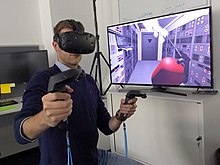Simulated reality
This article has multiple issues. Please help improve it or discuss these issues on the talk page. (Learn how and when to remove these messages)
|

A simulated reality is an approximation of reality created in a simulation, usually in a set of circumstances in which something is engineered to appear real when it is not.
Most concepts invoking a simulated reality relate to some form of computer simulation, whether through the creation of a virtual reality that creates appearance of being in a real world, or a theoretical process like mind uploading, in which a mind could be uploaded into a computer simulation. A digital twin is a simulation of a real thing, created for purposes such as testing engineering outcomes.
In fiction
All fiction can be said to present a simulated reality to the reader, viewer or player. Humans purposely experience these things and enjoy them, while knowing they are not actually real. As humans only respond emotively to things we believe to be real, this phenomenon has become known as the "
The concept of a simulated reality is in itself a common
Other prominent examples of a simulated reality in fiction include franchise, a simulated reality called "the Grid" is populated by programs which appear in the likeness of the programmer who created them. People who are "beamed" into the Grid are able to interact with these programs and their digital surroundings.
In real life
A well-known, albeit likely false claim of the use of simulated reality outside of virtual worlds is the
Immersive theater involves the audience entering a physical simulation of reality created by actors and sometimes enhanced by a specific location, allowing them to affect the narrative with their own actions in a manner noted to closely resemble virtual reality.[4] Live action role-playing takes this a step further, allowing players to inhabit a simulated world and create the narrative with their actions, while embodying characters they created.
One concept of a simulated reality, the simulation hypothesis, proposes that what we experience as our reality is actually a simulation within a system being operated externally to our reality.
References
- ^ a b Worth, Sarah E. (2003). "The Paradox of Real Response to Neo-Fiction". The Matrix and Philosophy: Welcome to the Desert of the Real. HarperCollins. pp. 181–182.
- ^ a b Blackford, Russell (2004). "Try the Blue Pill: What's Wrong with Life in a Simulation?". Jacking In to the Matrix Franchise: Cultural Reception and Interpretation. pp. 174–175.
- ^ Rosso, Cami (2018-05-20). "How "Westworld" Ignites the Deep Thinkers Among Us". Psychology Today. Retrieved 2024-04-03.
- ISSN 2210-5441.
